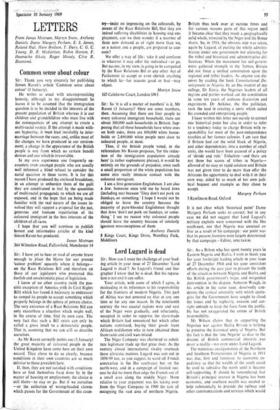Lord Lugard is dead
Sir: How can I resist the challenge of your lead- ing article in your issue of 27 December 'Lord Lugard is dead'? As Lugard's friend and bio- grapher I know that he is dead. But his reputa- tion is not and it can suffer.
Your article, with some of which I agree, is misleading in its references to his responsibility for the frontiers of modern Nigeria. This part of Africa was not annexed en bloc at any one time or for any one reason. In the nineteenth century the two coastal regions west and east of the Niger were gradually, and reluctantly, occupied in order to suppress the slave-trade which Britain had renounced but which other nations continued, buying their goods from African middlemen who in turn obtained them from raids and civil wars inland.
The Niger Company was chartered' to substi- tute legitimate trade up that great river. As the century closed international rivalry overtook these altruistic motives. Lugard was sent out in 1898-99 not, as you suggest, to ward off French annexation in the Ibo south-east but on the north-west, and in a campaign of limited suc- cess he did no more than edge the French out of a small area along the middle Niger. More relative to your argument was his taking over from the Niger Company in 1900 the task of occupying the vast area of northern Nigeria. Britain thus took over at various times and for various reasons parts of this region until it became clear that they made a geographically solid whole, trisected by the Niger and the Benue rivers. So, in 1914, the obvious step was taken, again by Lugard, of putting the whole adminis- tration under one government but allowing for the tribal and historical and administrative dif- ferences. When the movement for self-govern- ment gathered strength in the 'forties, Britain did. not force a unified constitution upon the regional and tribal leaders. As anyone can dis- cover by reading the book Constitutional De- velopment in Nigeria, by an lbo student of my college, Dr Ezera, the Nigerian leaders of all regions and parties worked out the constitution in some ten years of arduous discussion and ;experiment. Dr Azikiwe, the lbo politician, took the lead in creating a unity which suited his crowded and enterprising people.
1 have written this letter not merely to correct one historical point but also in order to refer to a. tendency today to charge Britain with re- sponsibility for most of the post-independence troubles of her former colonies. I am sure that if Britain had cut the solid block of Nigeria, and other dependencies, into a number of small units, she would have been accused of a policy of 'divide and rule Tribalism—and there are not three but scores of tribes in Nigeria— allowed of no easy or rapid solution and Britain was not given time to do more than offer the Africans the opportunity to deal with it in their own way, aided by as much of her own poli- tical . bequest and example as they chose to accept.
Margery Perham 5 Rawlinson Road, Oxford
It is not clear which 'historical point' Dame Margery Perham seeks to correct; but in any case we did not suggest that Lord Lugard's military exploits were concerned with the Ibo south-east, nor that Nigeria was annexed en bloc as a result of his campaign : our point was that its present frontiers were largely determined by that campaign.—Editor, SPECTATOR.


































 Previous page
Previous page